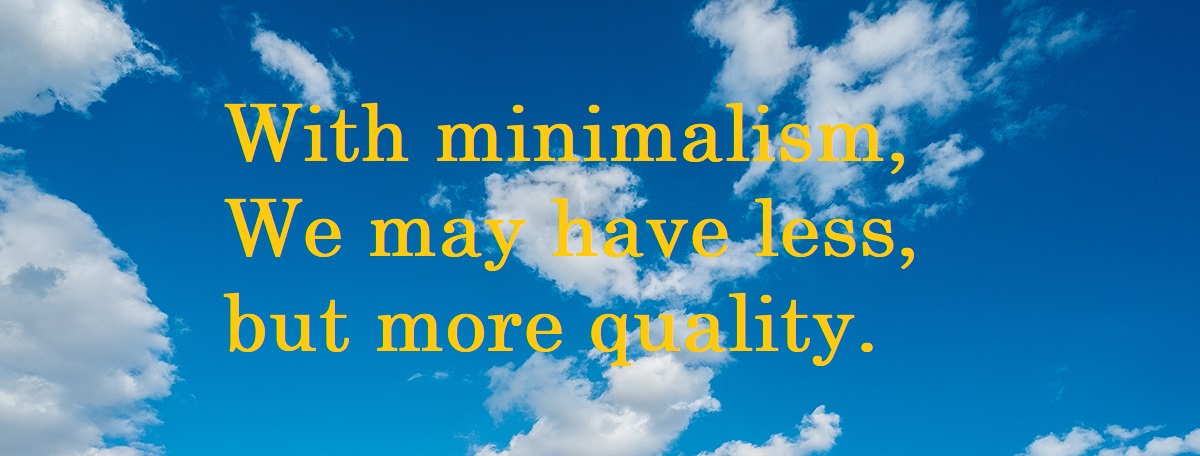Minimalism

Minimalism is not only an interesting lifestyle but also brings many benefits, especially in an era of so many choices like today’s life.
1. What is Minimalism?
Minimalism is a lifestyle practice focused on minimizing distractions that keep you from doing what matters to you, which is the process of sifting through things that do not create value, so that we no longer have to waste energy on those things. From there, we focus on living with the things that create the most value for us.
We only have a certain amount of energy, time, and space in our lives. In order to make the most of it, we must be intentional about how we’re living each day.
Minimalism is also not a one and done project.
We could use minimalism as a continual practice to ensure everything in our lives is working for us in our vision, not against us and to make substantial changes in careers, home, lifestyle, buying behaviors, etc.
2. Benefits of a minimalist lifestyle
a. Minimalism is interesting
Minimalism does not mean living a miserable life, not knowing how to enjoy it. Moreover, minimalism also does not mean owning as few things (furniture, clothes, assets) as possible. Instead, a minimalist life focuses on things that bring a lot of value, emotion. Let us enjoy what we have.

Realistically, everyone should be a minimalist. Who doesn’t want to be surrounded by everything that’s important and nothing that weighs us down? It makes a ton of sense when you start to think about it.
Note that you don’t have to call yourself a minimalist either. The way I see it, minimalism isn’t my identity or some goal to achieve; it’s a tool used as part of the framework of doing more of what matters.
b. More time, more energy, more options
Time and energy are limited. Minimalism will save you time and energy, thereby opening up many new options for us. Because choice is probably the greatest benefit in this life. We get to live the life we want - that’s happiness.
c. Minimalism is an effective tool for living an intentional life
In the end, minimalism is less about owning fewer items and more about actively making choices on what kind of things truly matter to you. It is not about not having enough information to choose from, but about choosing the most appropriate after evaluating other options.
We exist in a society that creates false value on owning more stuff and having no time to use them much. The constant pursuit of bigger and better is an endless cycle. There will always be a nicer car to buy, a bigger boat, a larger home, and or a faster private jet. Did you know that there’s a website for billionaires to shop? Yeah. It never ends.
It may seem like an overwhelming challenge at first, but as you untangle the life you built around owning more things, you’ll find the stress disappearing and the world starting to slow down. Those choices you make will begin to build muscle that will fundamentally change the way you live your life.
3. Practice minimalism
The best way to practice minimalism is to start with the smallest things in our daily lives. Starting small is the best way to get started on something that feels like a big change.
a. Find one thing, remove it from your home
You can research yourself into oblivion, but the best way to get started is to just find one thing you don’t need anymore and let it go (by selling or donation).
Minimizing material desires will help you have more space, money, focus on quality things.
b. Stop the influx of new things
The next immediate step is to stop the influx of new things that you don’t actually need. Whether that means logging out from Amazon or not going to the mall anymore, take steps to prevent yourself from purchasing new things that will continue to clutter your home. Create some guiding questions about what types of things add value to your life and which types of things don’t add value. Beware of the False First Step—buying something for the aspirational version of yourself instead of taking a minimally viable action using what you have already.
c. Start changing mindset
Along with the practice of minimizing, your mindset will also gradually change. You will know enough to be happy, know what is right, what is important and what should be prioritized.
- Minimize relationships: If you’re not comfortable with a relationship, cut them off
- Minimize things to do: Your to-do-list should not cover everything
- Minimize goals: We cannot achieve everything at once
- Minimize concerns: don’t worry about what do others, newspapers, radio stations, neighbors… say
- Minimalism in investing
Obviously, minimalism is an interesting lifestyle, a useful tool to get the life we want. Let’s start with minimalism from the most everyday things and change your mindset to live a life worth living.
Enjoy Reading This Article?
Here are some more articles you might like to read next: